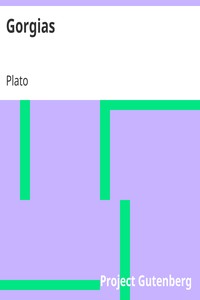Gorgias by Plato
"Gorgias" by Plato is a Socratic dialogue written around 380 BC. In this work, Socrates confronts self-proclaimed teachers of rhetoric at a dinner gathering, challenging their claims about the art of persuasion. Through pointed questioning, he explores whether rhetoric is truly a craft or merely flattery, examines its moral implications, and investigates the relationship between persuasive speech and truth. The dialogue reveals tensions between philosophical inquiry and the popular rhetorical education valued
in classical Athens. (This is an automatically generated summary.)
Read or download for free
| Reading Options | Url | Size | |||
|---|---|---|---|---|---|
| Read now! | https://www.gutenberg.org/ebooks/57145.html.images | 456 kB | |||
| EPUB3 (E-readers incl. Send-to-Kindle) | https://www.gutenberg.org/ebooks/57145.epub3.images | 215 kB | |||
| EPUB (older E-readers) | https://www.gutenberg.org/ebooks/57145.epub.images | 221 kB | |||
| Kindle | https://www.gutenberg.org/ebooks/57145.kf8.images | 350 kB | |||
| older Kindles | https://www.gutenberg.org/ebooks/57145.kindle.images | 329 kB | |||
| Plain Text UTF-8 | https://www.gutenberg.org/ebooks/57145.txt.utf-8 | 416 kB | |||
| Download HTML (zip) | https://www.gutenberg.org/cache/epub/57145/pg57145-h.zip | 212 kB | |||
| There may be more files related to this item. | |||||
Similar Books
About this eBook
| Author | Plato, 428? BCE-348? BCE |
|---|---|
| Translator | Koskimies, Kaarlo, 1851-1918 |
| Title | Gorgias |
| Note | Wikipedia page about this book: en.wikipedia.org/wiki/Gorgias_(dialogue) |
| Credits | E-text prepared by Tapio Riikonen |
| Reading Level | Reading ease score: 39.0 (College-level). Difficult to read. |
| Language | Finnish |
| LoC Class | B: Philosophy, Psychology, Religion |
| LoC Class | PA: Language and Literatures: Classical Languages and Literature |
| Subject | Classical literature |
| Subject | Political science -- Early works to 1800 |
| Subject | Ethics -- Early works to 1800 |
| Category | Text |
| EBook-No. | 57145 |
| Release Date | May 12, 2018 |
| Copyright Status | Public domain in the USA. |
| Downloads | 232 downloads in the last 30 days. |
| Project Gutenberg eBooks are always free! | |

